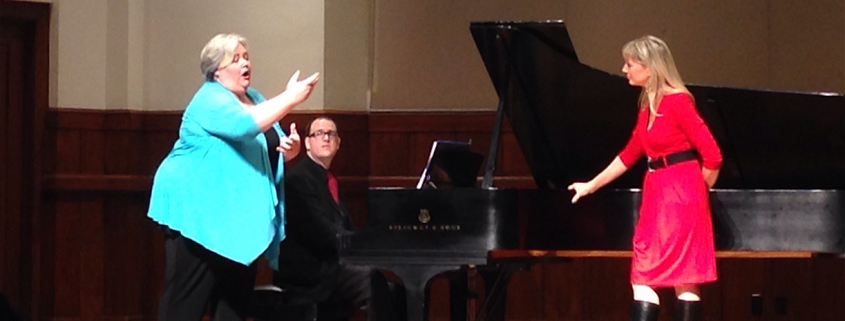Opera singer Stephanie Blythe teaches master class
On Oct. 16, internationally renowned opera singer Stephanie Blythe gave a master class in Newman Recital Hall to students through the Thornton School of Music’s Vocal Arts and Keyboard Collaborative Arts programs.
Blythe maintains a reputation as one of the greatest mezzo-sopranos of her generation. Known for her thunderous voice and intelligent interpretations, the American singer has performed at some of the finest opera houses in the world, including the Metropolitan Opera, the San Francisco Opera and Covent Garden, among others. In addition to maintaining a celebrated operatic career, Blythe is an avid recitalist and has debuted many contemporary song cycles by American composers, including works written by Alan L. Smith, director of Keyboard Collaborative Arts at USC.
Smith and Blythe have a close professional and personal relationship, having collaborated together many times over the years. Smith introduced Blythe to the audience with much sincerity and cherishment, presenting her as a close friend rather than a colleague.
“She is compassionate, and fiercely loyal to those she loves,” Smith said.
As Blythe began, she emphasized that her guidance, though reinforced with many years of success, should be taken with a grain of salt.
“If what I’ve said doesn’t help you, just let it go,” Blythe said, drawing laughs from the audience.
Blythe worked with three singers, all graduate students in the Vocal Arts program. The class commenced with mezzo-soprano Kristin Erbst and pianist Robert Blake, who performed two songs from Richard Pearson Thomas’s “Cabaret Songs.” Erbst sang the first piece “Why Can’t I Let You Go?” elegantly and with crystal-clear diction, though Blythe specified that she lacked an intimate connection with the audience.
“We can’t just see your ghosts … [The audience] needs to see their ghosts as well,” Blythe said, pushing Erbst to dig deeper into her emotions.
Erbst sang the second piece, “Damaged,” with smoky and delicious timbre, commanding the audience’s attention as she trickled sexuality across the stage. Blythe worked with Erbst on supporting her tone through the entirety of each phrase while still maintaining conversational-like ethos in her voice.
“[The song is] entirely conversational; you just need to sing it,” Blythe said.
Following Erbst and Blake were tenor Justin Su’esu’e and pianist Chelsey Padilla, who performed “Cancer” from Tom Cipullo’s song cycle “Another Reason Why I Don’t Keep a Gun in the House”. The music is set to the poetry of Billy Collins, which employs a wide range of text settings, both morbid and humorous. The music swells dramatically then suddenly retreats, which according to Su’esu’e, is an allegory for the poetic text.
Su’esu’e possesses a sizable voice that carried effortlessly to the back of the hall. Like with Erbst, Blythe worked with Su’esu’e on supporting the tone throughout the entirety of the phrase. She also urged him to maintain clarity of the text as he sang into his lower register.
Last to perform were mezzo-soprano Lesley Baird and pianist Jasper Jimenez, who performed “Going to Heaven” from Aaron Copland’s Twelve Poems of Emily Dickinson. Baird gave a deep and heartfelt interpretation of the piece. As with the other singers, Blythe worked with Baird on keeping the focus in her tone in line with her support. Blythe also worked with Baird on refining her dramatic interpretation without going over the top.
“Maintain a little bit of mystery,” Blythe said. “That’s what makes you an artist.”
This master class precedes a highly anticipated concert of Smith’s works through Visions & Voices, in which Blythe is also performing. The performance will be held on Tuesday, Oct. 20th at 7:30 p.m. in Newman Recital Hall.

